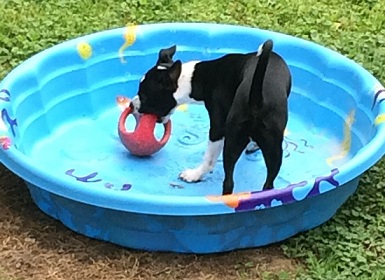Summer Pet Care Tips
Summer pet care requires mainly being aware of the immediate environment. Keeping our pets safe is a priority for all of us and a little common sense goes a long way, as the old saying goes. If your pets are like mine, they enjoy the outdoors tremendously. Dylan, especially, wants to be outside every waking minute whenever possible. This means I have to be aware of his immediate surroundings whether we're at home and certainly if we're in a strange neighborhood or public area.
Pesticides, Insecticides, Fertilizers, Weed Killers and Pool Chemicals
One reason it's so important to remain aware of where our pets play is because of the heavy use of chemicals in the summertime. Your neighbors may use pesticides to ward off fleas and mosquitoes, weed killers to control dandelions and other invasive plants, and fertilizers to help the grass grow. All of these can be beneficial for maintaining a manicured lawn and comfortable outdoor space. However, these chemicals can be deadly to our pets.
 In addition, insect repellants formulated for human use cannot be used on our pets or left where the chemicals could be ingested. Treat the situation as a life-threatening emergency if your pet ingest insect repellant and contact your vet immediately for instructions.
In addition, insect repellants formulated for human use cannot be used on our pets or left where the chemicals could be ingested. Treat the situation as a life-threatening emergency if your pet ingest insect repellant and contact your vet immediately for instructions.
When thinking about chemicals, remember the swimming pool. Chemicals used to clean and purify swimming pools can be harmful to our pets. Therefore, regardless of how much your dog or cat loves to swim, allowing him or her to jump in the pool right after it has been treated is not a good idea.
Water and Dehydration
Fresh water, readily available at all times, is a necessity year-round. In the summer months in Kentucky, outdoor water bowls must be changed frequently or it ends up becoming a nesting spot for mosquitoes and/or warm as bath water, even in full shade.
Mud puddles and other pools of standing water are not acceptable drinking spots for our pets. Dirty water can harbor a number of bacteria that cause illnesses. Waterborne diseases like cryptosporidiosis, giardiasis, leptospirosis, and pythiosis, among others, pose serious threats to our pets' well-being.
Speaking from personal experience, I can say leptospirosis is a horrible disease. About 16 years ago I rescued a dog that was tied in the woods in a Lexington community. Apparently, he was rarely fed or given fresh water and when he was, rats got into his food and water. The vet diagnosed him with leptospirosis and I spent approximately $3,000 for treatment, yet he died from the disease.
I cannot emphasize enough the importance of fresh, clean water.
Your pet may run and play extensively without taking a water break. My pup does this and has to be reminded to drink. Dehydration is a serious condition in both cats and dogs. Symptoms of dehydration in dogs, according to the American Kennel Club are dry nose and gums, dry eyes, reduced appetite and energy level, loss of skin elasticity, and panting. Symptoms are the same in cats, but cats may also experience an increased heart rate.
Shade and Heatstroke
Pets enjoying the outdoors for any length of time need easy access to shady areas. Ideally, shade with good air circulation is best. An outdoor doghouse is NOT a well-ventilated area.
And whatever we do, we can NEVER leave a pet unattended in a hot car. Heatstroke is a serious and life-threatening condition for our pets and can happen quickly.
Picnics and Barbeques
Be especially cautious when grilling in an area that your pets have access to as food smells can lead them into big trouble. For example, Dylan loves the smell of meat grease and once got much too close to the hot grill for my liking. Curious pets could easily topple a small grill like mine if they bumped it from the side.
When we're grilling out or having a picnic, it's important to remember too, that certain foods we throw on the grill can harm our pets. Onion and garlic top the list along with the bones in most any meat except beef. Also, consider summer fruits such as grapes and avocados and as always keep pets away from chocolate and alcoholic beverages in any form.
Sunscreen
Your pet may need sunscreen if he or she spends time in the hot sun, especially short-haired cats and dogs and those with lighter coats. If you think your pet needs sunscreen, first talk with your veterinarian. Avoid sunscreen products made for humans, as many contain multiple ingredients that are toxic to our pets. If your vet recommends that you use sunscreen, find one made specifically for animals. In addition, if your pet inadvertently ingests sunscreen products, treat this as an emergency and call your vet immediately.
Walking the Dog
When walking our dogs, we must be aware of manicured lawns and grassy areas in public parks and common areas for reasons stated above about chemicals. In addition, when walking the dog remain aware of spilled antifreeze. Although we associate antifreeze with winter weather, cars overheat and leak antifreeze more in the summer months. A puddle on the ground will quickly garner a dog's attention. I'm not sure why manufacturers don't make the stuff repulsive to animals. I'll check into that. In its current form, cats and dogs love the taste and it's deadly to them in very small quantities. Therefore, this is something we need to be aware of for our cats, too, if they go in and out by themselves or live outside year round.
Another issue to remain aware of when walking our dogs is paw burns. Spending too much time on hot asphalt, concrete or clay surfaces can cause paw burns in dogs. These painful injuries take a long time to heal and can easily become infected.
It is recommended that we walk our dogs on concrete in cooler weather to toughen the paw pads as they will become thicker and stronger with use and when the temperature is too high, it's best to avoid concrete and paved areas altogether whenever possible.
Fleas and Parasites
 Mosquitoes, fleas and other parasites typically are much worse during warmer weather. Dealing with these pests is a necessity for pet owners. Fortunately, the markets abound with products specifically developed to fight off these nasty varmints. I can't personally recommend a particular flea product, as I myself use different things for different animals. However, I can recommend that you research what's available yourself and speak with your vet about what might work best for your particular pet. Recently, my pup Dylan, had a problem with fleas. As stated earlier, he enjoys spending most of his waking hours outside in the fenced-in backyard. I want him to be able to continue doing this as much as possible, so I'm trying a new, expensive, flea collar that is advertised as warding off fleas for eight months. I'll let you know how that works out after he's worn it for a while. It does seem to be helping now after three days.
Mosquitoes, fleas and other parasites typically are much worse during warmer weather. Dealing with these pests is a necessity for pet owners. Fortunately, the markets abound with products specifically developed to fight off these nasty varmints. I can't personally recommend a particular flea product, as I myself use different things for different animals. However, I can recommend that you research what's available yourself and speak with your vet about what might work best for your particular pet. Recently, my pup Dylan, had a problem with fleas. As stated earlier, he enjoys spending most of his waking hours outside in the fenced-in backyard. I want him to be able to continue doing this as much as possible, so I'm trying a new, expensive, flea collar that is advertised as warding off fleas for eight months. I'll let you know how that works out after he's worn it for a while. It does seem to be helping now after three days.
I've written in detail previously about mosquitoes in relation to heartworm disease and how to reduce the mosquito population and won't repeat myself here.
Emergencies
Heatstroke, dehydration and other conditions associated with summer weather can quickly become an emergency situation for your pet. It's recommended that you keep emergency numbers for your vet handy at all times and to know where you can go for help after hours and on the weekends. It helps also to know what to do in a particular emergency. For example, if your pet overheats, drain any hot water left standing in your garden hose and spray them down with cool water immediately, then take your pet to your veterinarian as quickly as you can.
Learning first aid for our pets BEFORE the emergency is always a good idea. See our resource page for more information on first aid treatment for pets. And if you have additional summer care tips you'd like to share, we'd be glad to add them on.
References
American Kennel Club: 6 Warning Signs of Dehydration in Dogs
American Veterinary Medical Association: 8 Things You Can Do to Protect Your Dog in the Summer
PetMD: Summer Safety Tips for Pets
The Humane Society of the United States: Tips for Keeping Your Pets Safe During Warm Weather
